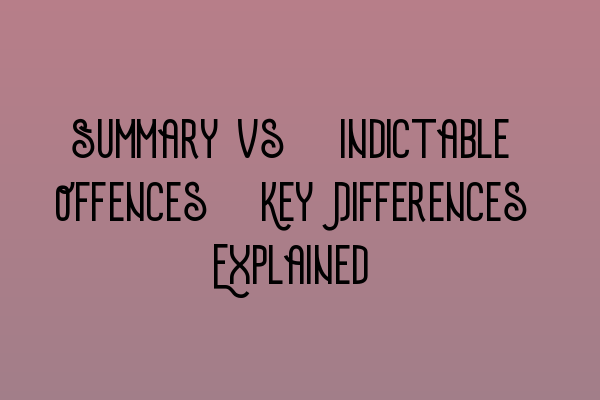Summary vs. Indictable Offences: Key Differences Explained
Welcome to the blog of SQE Criminal Law & Practice Law UK! In this post, we will dive into the key differences between summary offences and indictable offences in the criminal justice system.
What are Summary Offences?
Summary offences are regarded as less serious crimes that are heard and determined in the Magistrates’ Court. These offences do not warrant a trial by jury and are usually dealt with summarily by a magistrate or a panel of magistrates. Examples of summary offences include minor theft, common assault, and traffic violations.
If you are preparing for the SQE 1 exam, make sure to check out our SQE 1 Practice Exam Questions to enhance your knowledge and test your understanding of criminal law.
Key Characteristics of Summary Offences:
- Less serious crimes
- Heard and determined in the Magistrates’ Court
- No trial by jury
- Dealt with summarily by a magistrate
- Examples: minor theft, common assault, traffic violations
What are Indictable Offences?
Indictable offences, on the other hand, are more serious crimes that are tried in the Crown Court. These offences require a trial by jury and carry potentially harsher penalties. Examples of indictable offences include murder, rape, and large-scale fraud.
To prepare for the SQE 1 exam, take advantage of our SQE 1 Practice Mocks FLK1 FLK2 to simulate real exam scenarios and assess your understanding of criminal law concepts.
Key Characteristics of Indictable Offences:
- More serious crimes
- Tried in the Crown Court
- Require a trial by jury
- Potentially harsher penalties
- Examples: murder, rape, large-scale fraud
Summary Offences vs. Indictable Offences: Key Differences
Now that we have a basic understanding of summary and indictable offences, let’s highlight their key differences:
- Severity: Summary offences are less serious compared to indictable offences.
- Forum: Summary offences are heard and determined in the Magistrates’ Court, while indictable offences are tried in the Crown Court.
- Jury Trial: Summary offences do not require a trial by jury, whereas indictable offences demand a trial by jury.
- Penalties: Indictable offences carry potentially harsher penalties due to their more serious nature.
To excel in your SQE examination, enroll in our comprehensive SQE 2 Preparation Courses to master the concepts of criminal law and practice.
Stay Updated with SRA SQE Exam Dates
Don’t forget to keep track of the important SRA SQE exam dates. Visit our SRA SQE Exam Dates page to stay informed about upcoming exams and deadlines!
That concludes our exploration of the key differences between summary offences and indictable offences. Remember, understanding these differences is crucial in navigating the criminal justice system. Stay tuned for more informative content from SQE Criminal Law & Practice Law UK!
